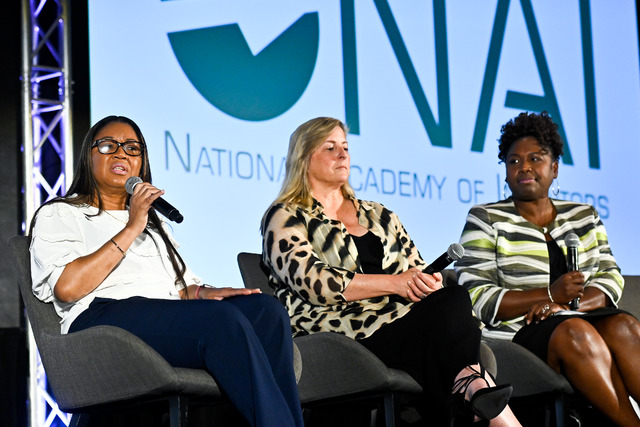
From left to right: Almesha Campbell, Suzanne Harrison, and Sylvia Thomas speaking at NAI’s 2022 conference.
Today’s elevators bear the name of its inventor, Elisha Otis. But little people know the man who created a patent that made elevators safer. African-American inventor Alexander Miles‘ daughter suffered serious injuries when the shaft and elevator doors were not properly closed on one occasion. This common error led to many deaths in the mid 1850s. So he created a mechanism that automatically allowed the doors and shaft to be closed, reducing the likelihood of such an accident again. His patent, issued in 1887, saved hundreds of thousands of lives, yet his contribution has virtually been forgotten.
How many more people from diverse backgrounds would join the fields of science and technology if the space were truly an inclusive community? One organization is working to make this happen. The National Academy of Inventors (NAI) highlights diverse minds who have been in the field all along and encourages the development of new academic inventors from underrepresented groups.
With this mission in mind, NAI brings together the world’s leading minds for its annual conference. This year’s gathering was held in Phoenix, Arizona this past June. A key topic of discussion was increasing diversity and closing the equity gap in the field of science and technology.
The National Academy of Inventors Addresses Inequity in the Patent Process
A significant barrier to creating diversity in the field of invention lies in the very process of applying for patents. Protecting intellectual property can prove daunting to people who lack resources and support.
The NAI has joined with the US Patent and Trademark Office (USPTO) to address the systemic and cultural challenges minority groups encounter during the patent process. Their joint mission is to increase diversity and inclusion. This five-year partnership is designed to help underrepresented groups better understand the process of applying for a patent.
“Today’s patent system process can be a challenge to navigate,” said the NAI’s Executive Director, Jamie Renee. “That’s why the National Academy of Inventors is excited to join the United States Patent and Trademark Office in addressing those unique challenges for historically underrepresented groups. Through our GAIN platform and Scholar Share webinars, we’re attempting to connect young inventors with the support and resources they need.”
The members of NAI are researchers, inventors and thought leaders from universities, government agencies, and non-profit research organizations from around the world. The 4,000-plus fellows of the academy hold 44 Nobel Prizes, 53,000 patents, and over 13,000 licensed technologies and companies between them. These are the minds that will collaborate in the effort to bring social justice and racial equality to the patent process.
National Academy of Inventors Focuses on Listening
While NAI cannot change the historical narrative, they are uniting to ensure the next generation of academic inventors represents the diversity in the world around them.
“Innovators from underrepresented groups can struggle to gain access to the resources and support they need,” said Renee. “Our mission is to make the academic inventing space more accessible by tearing down this barrier. We are collaborating to create an inclusive culture that fosters everyone’s creativity and protects everyone’s ideas.”
Inspiring this culture of diversity and inclusion in the academic inventing space begins by reaching out and listening to women, minorities, veterans, and individuals with disabilities. And at NAI’s 2022 conference, the theme focused on “Defining the Future: Inventing for Tomorrow” with a heavy emphasis on addressing equity gaps.
“One of the esteemed panelists on our diversity, equity, and inclusion panel said innovation happens everywhere, but it’s funded only in some places. This perfectly sums up the problem with the current state of innovation,” said Renee.
Several group sessions allowed individuals from diverse backgrounds to share their experience in the inventing space and provide examples of challenges they faced. And while many discussions on this topic happened during the conference, others took place organically behind the scenes. Officials of research and innovation at universities, philanthropic organizations, and seasoned inventors spent time discussing how to synchronize NAI’s efforts to address the equity gap.
“We’re moving forward on this effort with an intention to challenge and improve our approach,” Renee explained. “At every meeting we ask, ‘Who is not here who should be? What perspectives have we not heard from?’ We want to invite others to join us and adjust the line as needed.”
Creating a Culture of Inclusion in the Invention Ecosystem
“It’s so important to put women and women of color at the front of these discussions,” said Renee. “It starts with showing young inventors that there are people that look like you doing amazing work. They’ve been there all along, we just needed to bring them to the forefront.”
Two notable attendees and discussion leaders who addressed this topic at the conference were Dr. Karen Panetta and Dr. Sylvia Wilson Thomas. Dr. Panetta is the Dean of Graduate Education for the School of Engineering and Professor of electrical and computer engineering at Tufts University. She is a world-renowned inventor and researcher in the field of computer-vision technology and is also the founder of Nerd Girls, an international program aimed at promoting and showcasing the need for women in STEM careers.
Dr. Thomas is the University of South Florida’s Vice President of Research & Innovation and a renowned researcher with over ten patents. She spoke on the conference’s Diversity, Inclusion, and Equity panel. Thomas is involved with organizations aiming to create a more diverse STEM field, including Black Girls Code, the Society of Women Engineers, and the National Society of Black Engineers.
“We will be better equipped to address complex challenges such as climate change and the next pandemic by leveraging humanity’s collective brainpower and examining these issues from a multitude of perspectives,” said Renee. “Increasing diversity and inclusion is more important than ever to the future of invention.”
Release ID: 311483













